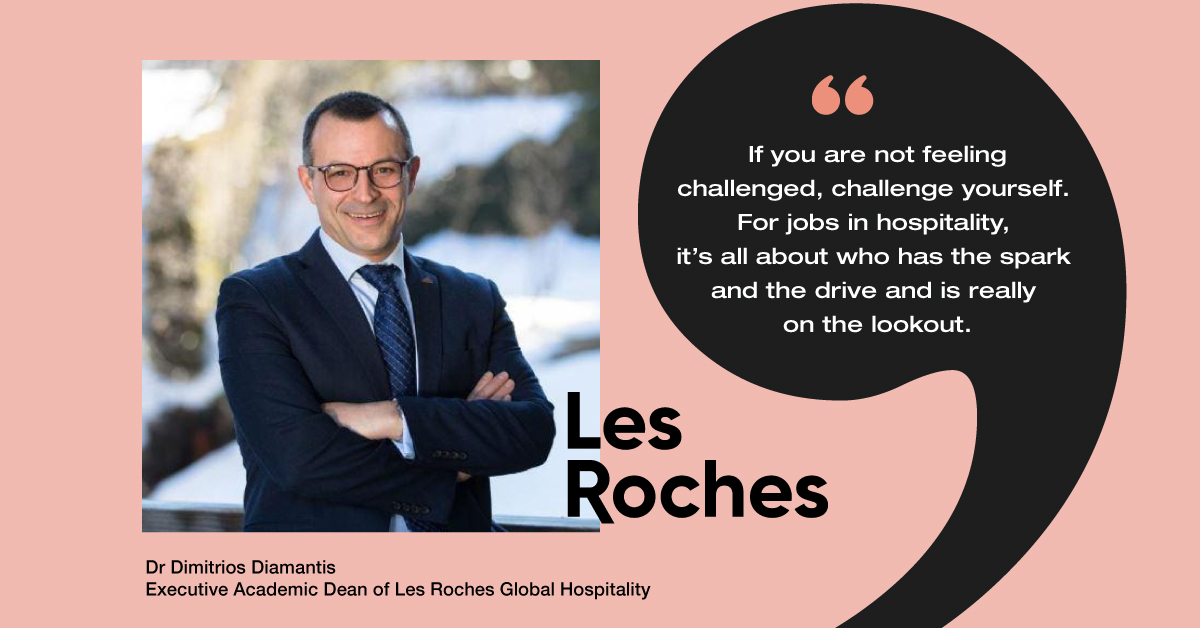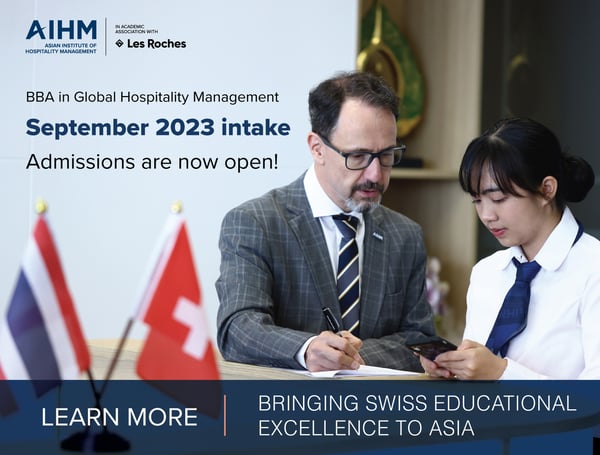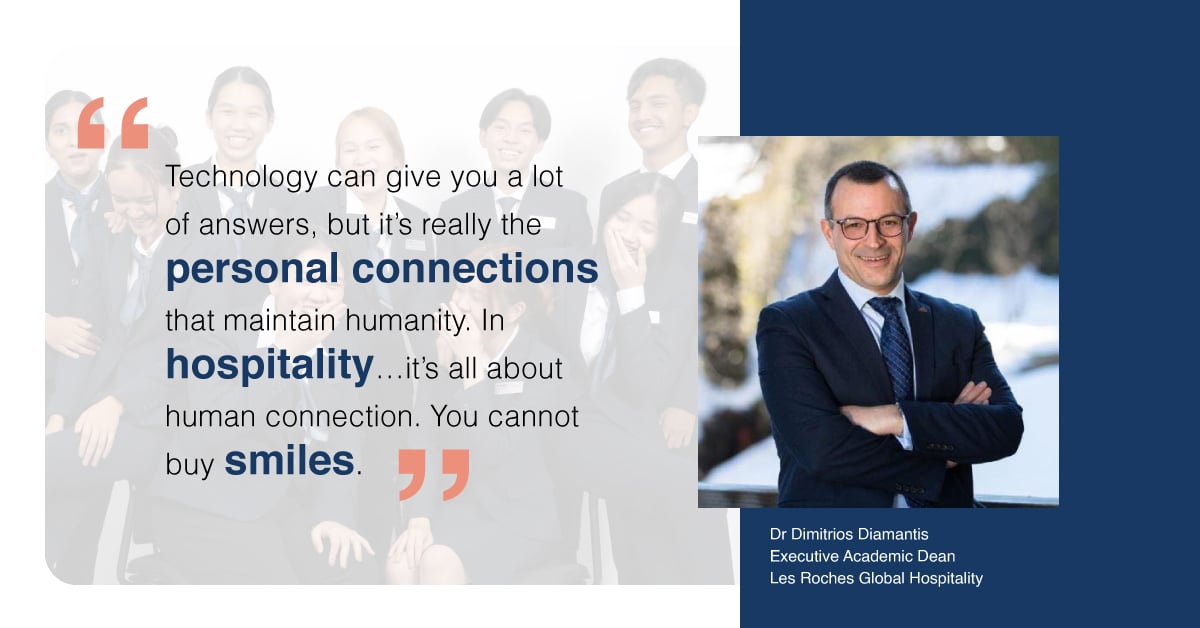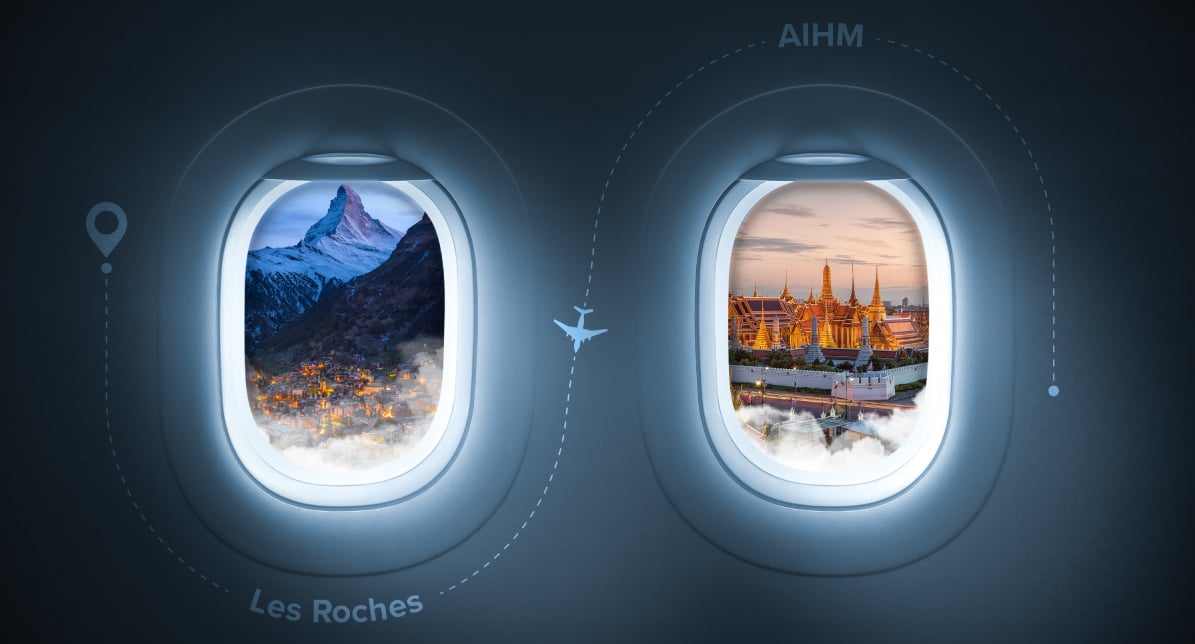AIHM Exclusive: An Interview with Dr Dimitrios Diamantis – Part 2

Dr Dimitrios Diamantis, the Executive Academic Dean of Les Roches Global Hospitality, sat down for an in-depth interview during his recent visit to the Asian Institute of Hospitality Management in academic association with Les Roches.
Below, he talks about what impresses him most about AIHM students, the similarities and differences between Les Roches and AIHM, and his advice for young people aspiring to careers in hospitality management.
Did you miss Part 1 of the conversation? Read ‘AIHM Exclusive: An Interview with Dr Dimitrios Diamantis, Executive Academic Dean at Les Roches Global Hospitality – Part 1’
The AIHM and Les Roches Experiences
SLM: Based on what you’ve seen so far, what’s your favourite part of the AIHM experience for students? Is it the fact that they’re so close to these hotels (Avani+ Riverside Bangkok Hotel and Anantara Riverside Bangkok Resort) or is it something different?
DD: First of all, what impressed me a lot last year and this year is the politeness of your students. That comes in part from the Thai culture, but it’s not only that. There is a sense of politeness and a sense of understanding. Those are wonderful characteristics of a hospitality DNA. You will always see not only a smile but also an engagement, and a warmth. That’s what really impressed me last year, and it was validated again this year. I could see it twice.
Your students are also mentally strong. You could see it in the class yesterday. It was 3.45 pm after their long day, and I could see strong levels of concentration. I could see a good follow-up and a lot of notetaking and at the same time a very strong command of communication skills. I could also see a hunger for growth, and that impressed me as well.
SLM: Thank you so much for saying that. One of the foundational things that we do during our Induction Weekend is to invite the students to ask each other what their dreams are and to be confident to speak it out to each other. They do have this element of politeness. They want to understand each other, to be able to support each other, to make their dreams come true. Because they understand that collaboration is the foundation for anything to become successful. You can’t go about it alone.
DD: No, you cannot go about it alone. Absolutely right. A sense of mutual respect paired with good communication helps a lot.

SLM: How would you say that AIHM and Les Roches are similar? And how are they different?
DD: We are similar in our principles. We have open communication. We have a depth of thought and openness in our relationship that helps a lot in terms of what you want to achieve. We have similar principles within the academic team and the management, and the curriculum is identical.
In terms of differences, location plays a big role. Being in the centre of a city of millions of people gives you a different type of pressure in comparison to us. We don’t, for example, have the traffic you have in Bangkok. We are in very slow-paced kind of environment. We have to also maintain a high degree of dynamism but in a different location.
Also, there are systemic differences based on our history. We started 70 years ago, so we feel a sense of responsibility to maintain what we’ve developed and grow it further for the next 70 years. We are different in this sense, but in terms of people, when I look at your faculty and staff, I can see a lot of warmth and a hospitality mindset. We say Les Roches is not a school; it’s a way of life. We showcase the Les Roches culture and who we are.
SLM: That’s the best way, I think, to spend a life… to love what you do and embody it.
Anticipating the Future of Hospitality
DD: This approach, thinking of Les Roches as a way of life, also focuses attention on the long term. My role as an Executive Academic Dean is so much more than meeting the student expectations semester by semester; my role is to make sure our curriculum is attractive in 5 years’ time, in 10 years’ time. I’ll give you an example. in 10 years’ time. I’ll give you an example. In 2001, one of the directors of Revenue Management for Four Seasons in Vancouver came to our school as part of an industry panel. Back in that period, we started to talk about revenue management. We’re one of the early adapters of revenue management going back to 2001. As a result of that, when the trend started to take off and when the industry needed more revenue managers, a lot of our students had the skills. They were job-ready and could apply not just the accounting practices that were called price management in those days, but revenue management. We’re proactive, and our education is attuned to the trends that will be happening in the industry tomorrow. Schools like ours have a responsibility to prepare students for what will happen tomorrow. We need to make our students job-ready, to make sure they have the skills they can apply moving forward. We feel a sense of responsibility because of our history; we’re continuing a journey.
SLM: We can learn a lot from the history that you have. As we move forward and progress and continue our own journey, we can continue to build on what Les Roches has developed over time and put it into practice here at AIHM.
Since this is your second time visiting our campus to ensure the quality of the AIHM programme, how would you describe the campus, students and faculty of AIHM to someone who has not yet had a chance to visit our school?

DD: I would recommend that people visit your school. It’s in a great location. It’s accessible. People can visit it and see not only the views to the outside—and they’re wonderful—but the innovative building and facilities you have. It’s fresh. It’s really current. It’s fantastic for student experiences, and that’s quite important.
You have a space that’s great for creativity. I like the openness. You can see from outside what happens in the classroom and you do that in a very subtle manner, in a very open manner, in a very transparent manner. The first thing that I noticed about your learning environment in this audit is how flawless it is. There’s a flawlessness and subtlety in the way things are working.
Being here for the second time, I’m also able to see what growth has been taking place over the last year. You can see the growth that has happened and the continuation of the growth. Our contribution is to see things in collaborative partnership, to be able really to help that particular kind of growth, and to identify what we see from our eyes or our experience that can be beneficial to you as you’re moving forward with your aspirations. That’s how we’re approaching this particular kind of auditing, through a collaborative partnership.
SLM: Speaking of the audit, as you’re nearing the end of your annual review, could you share with us how the audit has been this year and how you feel AIHM is doing and delivering the world-renowned quality Swiss educational experiences that Les Roches is known for?
DD: From the period of our last audit a year ago until today, we have pretty much had at least two touchpoints with the academic team every month, and those conversations are actually formal meetings. The audit is really the completion of a year’s worth of communication. We can see things that have been implemented based on our advice and also new areas for growth. For us, the audits are a chance to highlight real successes, to celebrate successes, and also to identify areas for future growth that you may or may not see yourselves. This is all done in collaboration and through the strong communication we have throughout the year. The end of the audit cycle is a kind of celebration. It’s not the kind of audit you see with, for example, a mystery guest programme where you go and scan to see if your coffee has the right beans. It’s not that type of audit. It’s more a celebration of communication. At the end of this cycle, we reflect on the action points that have been highlighted. We look at all the data.
A year ago we were looking at the first semester of the BBA programme and how and why it should be implemented in a particular kind of format. A year later, we see the results of this implementation. The other day we looked at the Bangkok Riverside Fest, the wonderful event your students engaged in as part of their first semester. In the pictures and videos, we could see the smiles on their faces, but we were also able to see some of what they’ve learned, what they absorbed through the experience.

Going back to your location and why it matters a lot, We can see how you’re able to do things in this city that other schools in other locations may not have the opportunity to do. As a result of that, there’s a sense of dynamism here at AIHM and a sense of culture and community which are very strong.
There’s a sense of Bangkok’s community—through its workforces, its celebrations, its festivities—the activities are very, very important. We still have two and half days to go before the audit is complete, but the feeling is very, very good. It’s super positive, and at the same time we’re able to establish points that will start the communication for next year’s cycle.
SLM: Excellent. This is something that you know we instill in our students; we are never going to stop learning and growing. That ethos is a very strong foundation that’s being set. It’s important to stay in a mindset of growth.
Advice for Our Hospitality Students
SLM: My final question is: what is your advice for our students to succeed in this changing landscape of hospitality?
DD: No need to rush to conclusions. A lot of students feel they need to, because of the pressures in today’s society, they need to achieve things very, very fast. They want to go to the top of the mountain very quickly. And that’s okay if you’re trained for it. Schools like ours give them this particular kind of training. When you want to climb a summit like in the Himalayas, you always spend some time in the camp. Your breathing techniques need to be right. You need to acclimate yourself to the mountain environment. So, what do we say to the students attempting to go to the summit? You need to have the right training.

Actually, you can do it in two ways. If you have the money, get a helicopter and have yourself dropped on top of the summit. That’s one way, but then on the way down you need to figure it out. The primary way to do it though is to get the right training, to place yourself in the right environment to prepare yourself. Environments like your school here in Thailand, as well as our schools in Switzerland and Spain, build the right mindset to prepare students for their job hunt in the hospitality industry. Also, students need to identify what is important for them at a particular moment in time. All the time we ask our students, “What are the skills you would like to grow?”
Coming from top ranked schools—from schools like the Asian Institute of Hospitality Management and Les Roches—gives individuals a good mindset and good platform. However, students must still carry out the personal reflections themselves. What are their strengths? What are their weaknesses? How early do they want to be challenged?
Everyone is going to be challenged at some point at their lifespan. A lot of people will be challenged at the beginning of their career. They may be challenged all the time. Challenges will happen. It’s a part of human nature. It’s a part of life in general—whether personal challenges, professional challenges, political challenges, or environmental challenges. I mean, look at the Covid pandemic and the government lockdown policies. You will face challenges. The question is how you cope with it and what do you really need exactly at this moment in time.

Coming from schools like ours that are renowned, jobs will occur. The question is: ‘How do you want to be challenged? In what ways?’ Growing their personal brand and building up a background of particular experiences happens with patience. You need to be patient to know yourself. It’s not like you can just look in the mirror and see, oh, I don’t like this detail, I need to change that. It takes time. As a result, we advise students to put time into the self-reflection. The most important thing is not to rush to conclusions straight away and not to be easily switched off after a couple of disappointments or a couple of companies that don’t work out for them. A lot of times things just don’t happen; that doesn’t mean it’s a personal flaw. You have to find the right place at the right time. Sometimes finding that is easy, and sometimes it’s quite challenging.
The other advice I would give young people aspiring to a career as a hospitality leader is: If you are not feeling challenged, challenge yourself. For jobs in hospitality, it’s all about who has the spark and the drive and is really on the lookout. For our industry, you want to see this kind of spark that exists in the young generation. You need to have a spark, and you need to have confidence. You need to grow that over a period of time.
SLM: Our students have big dreams and being able to get there does require a lot of patience, but also an awareness of themselves, as you have mentioned, and also the willingness to ask for more when more is not yet present. So, when they go into their internships, they can say, “How can I contribute to the success of this organisation?”

DD: Absolutely. Proactiveness is the key. One of our recent collaborations by Les Roches in Europe was a partnership we developed with a company called Match Hospitality. Match Hospitality is in corporate hospitality. They work very closely with FIFA and provided corporate hospitality internships for the Qatar World Cup. We sent 33 of our students to offer corporate hospitality in the stadium, in the fan zone, in the facilities. When we talked about it to the students the first time, they knew about the World Cup, but they didn’t know really about this kind of hospitality work as a sector of opportunity. The head of that particular department of that organisation was a Les Roches alumnus. She was in my class. You could see her leadership and dynamism back during her studies. After the Qatar FIFA World Cup, the company went to Australia and New Zealand for the women’s World Cup. They were providing the soccer support for Canada, USA and Mexico. As a result of that, the students could see that they could practice hospitality in a corporate hospitality context. They could use the same skills not in a hotel setting, but in a sports centre. That really gives them another set of reflections and ideas of what they can do.
I take MBA students on study trips. One of the companies I used to take students to visit was an event company in Shanghai, China. It was a company showcasing foreign brands to the city of Shanghai—from luxury brands to sporting competitions to others. For example, Chanel was bringing a new type of clothing to Shanghai and this company’s activation groups were showcasing this product in the old Shanghai train station with the old trains coming down. That kind of work takes creativity, innovation. It takes long hours of work before, during and after the event. You have to take into account health and safety issues, et cetera. It’s similar to what’s going on in a traditional day-to-day hotel environment. The skills are the same. The diversity of what you can do with them is what we like to highlight for our students.
SLM: Incredible examples across the board. Thank you, Dimitrios, for taking the time to speak with me today. We’re all looking forward to seeing you again this afternoon for a Q&A session where our students will have the opportunity to ask questions about what it’s like to live and study at Les Roches Crans-Montana in Switzerland and in Marbella, Spain.
DD: Thank you so very much, Samantha. The pleasure was all mine.

Is Hotel School for You?
Explore your passions for travel, creativity and entrepreneurship at the Asian Institute of Hospitality Management in Academic Association with Les Roches. Discover our BBA Degree in Global Hospitality Management.



